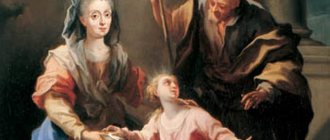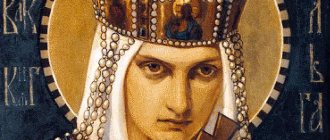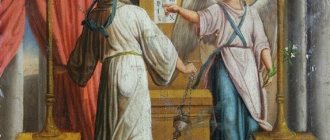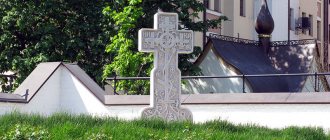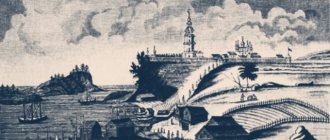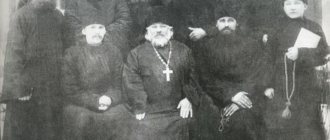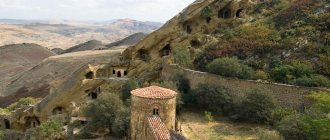Righteous Tabitha is the patroness of seamstresses.
Righteous Tabitha is the patroness of seamstresses.
Another living apologist for labor.
November 7/October 25
“Pure and undefiled godliness before God is this: to look after the orphans and widows in their afflictions...” (James 1:27).
There was a disciple in Jopia named Tabitha, which means chamois. She was a modest, unnoticed student. Her ministry was to sew for the poor in the community. Tabitha had every reason to think: “I am not a prophetess like Miriam, and I cannot rule the country like Deborah. I am not a woman who could play a big role in the history of her people. I am not one of the gifted." Marriage and motherhood did not fall to her lot. But Tabitha was called a disciple of Christ. True faith always wants to manifest itself in deeds . This convicts me too. At first I sewed for others for free, but then I realized that people did not value and used my time without respect and... I stopped sewing for free. Joppa, a Mediterranean port, probably sheltered many widows. During the harsh seasons, fishermen were often shipwrecked and drowned. This not only deprived them of income, but often made their wives widows. At that time there were no social organizations that we know now. There was no need for them, because God again and again commanded His people to care for orphans and widows (Ex. 22:22-24; Deut. 10:17-18). When the people followed the command of God, the widows did not suffer need, and the people themselves enjoyed all the blessings that God promised as a reward (Deut. 14:29; 24:19). The Lord gave the promise to widows that He Himself, as the Creator, would be their spouse (Isa. 54:4-5). They stood under His special protection. As a disciple of Christ, Tabitha knew how she could please her Lord, namely by caring for a group of people whom He especially loved. She works not just to pass the time, but diligently, purposefully, with all her heart. The meeting with Jesus made Tabitha a free woman. Jesus, who called Himself the Truth (Isaiah 14:6), said that the truth makes free and all whom the Son of God sets free will be truly free (John 8:32,36). Tabitha lives in this freedom. The Bible allows for the possibility that one may remain unmarried. But for her, it seems, this was not a reason to indulge in feelings of inferiority. She had no need to compete with married women for equal status . She does not envy mothers with children. He who is free can develop according to his own character. An internally free person is happy and can make others happy. He is an indispensable member of society. Such a woman does not need to fight for her rights or for any role. She doesn't have to work hard to become someone . She is already a person. Tabitha lives for others. She helps those in need with her sewing. Tabitha has few personal desires of her own, and therefore she is always happy and content. In Joppa, the number of widows who are grateful to Tabitha and wear dresses sewn by her increases. Suddenly the unexpected happens. Tabitha fell ill and died. Knowing that ap. Peter, who is near Joppa, has supernatural gifts, and the widows send two men to bring him. Were there not sick people who were healed as soon as Peter's shadow fell over them? (Acts 5:15) Didn't he and John heal a lame man? (Acts 3:1-10). Peter, on whom all hopes are placed, comes, In the upper room where Tabitha lies, he is surrounded by weeping women. They show the dresses Tabitha made for them and explain what a loss her death means to them. People often say only good things about the dead. But here it is clear that this loss was truly a great deprivation for those who remained. Tabitha’s Love awakened mutual love in many hearts, and it could not be otherwise. Peter does what the Lord did in similar situations. He sends people out, prays and resurrects Tabitha through the power of God. The news of the resurrection has crowded out all other news in Joppa, Tabitha becomes the topic of conversation. “You heard,” people turn to one another. “Tabitha lives again.” Peter raised her!” Then something amazing happens. People begin to understand: God performed this miracle. They do not glorify Tabitha or Peter, they glorify God. Many people, thanks to this event, recognize the emptiness of their own lives. They also want to believe in Jesus Christ. They begin to understand something about the real value of life. They desire, like Tabitha, to belong to Jesus and become Christians, new people born for the Kingdom of Heaven.
“What is that in your hand?” - God asked Moses in ancient times (Ex. 4:2-5). He answered: “The rod.” God said, "Use this rod; you must be My servant." If God had asked Tabitha, “Tabitha, what is in your hand?” - she would probably answer: “Needle and thread, Lord.” God would then show her that they are her instruments to serve Him. Working with a simple needle and thread was supposed to give her life unlimited, hitherto unknown rich content.
Nowadays, there are many associations called Tabitha around the world, among them a large international organization. Today, millions of people in need receive clothing and support. And who can count the women who were motivated by the example of Tabitha, who, like her, want to prove the essence of the Gospel by deeds? The worthy example of Tabitha will always inspire the followers of Christ. What more could a student ask for?
Today I had a dream again! Although not associated with St. Tabitha, I’ll tell you anyway, because it’s very instructive. I dream that a war has begun. Fear, confusion, everyone is running somewhere, collecting things, panic... and I am in this panic, in this state that is completely unusual for my spirit. And the soul resists this, but the mind says: let’s run too, like everyone else. And at some point, when danger is already close, it suddenly dawns on me: I HAVE TO PRAY! I pray “Our Father” many times in a row... and everything inside and then around me calms down, all the fuss, running around, imaginary such an important danger... paradise and silence inside! And then I redeem myself that this is a dream, and the thought: Wow, this is a dream! Well, you can stop praying.
It would be better not to stop...
On November 7, the Church remembers the saint of the 1st century - righteous Tabitha , whose life example is an image of genuine Christian love.
Saint Tabitha lived in Joppa, a port city on the Mediterranean Sea. The city still exists today and is called Jaffa. Modern Jaffa is located two kilometers from the largest city in Israel - Tel Aviv.
The name Tabitha, which means “chamois,” was quite common among the Greeks and Jews. Chamois, thanks to her grace, beautiful appearance and beautiful eyes, became her own female name, just like the male name Leo.
Tabitha was distinguished by her extreme mercy and charity. She mastered the art of tailoring, and as soon as she saw that one of the poor needed clothes, she immediately sewed the necessary thing for him. However, Tabitha was not limited to this. She did many other good deeds and was loved by people for it.
It so happened that Tabitha fell ill and soon died. This news upset all those who knew the saint. Just at that very moment
Not far from Joppa - in Liddi - the Apostle Peter preached. Love for the deceased, as well as fresh memories of her good deeds, prompted the city residents to send messengers to the apostle.
When the Apostle Peter arrived at Tabitha’s house, many of those who were near her body began to show him things that the deceased had made for them. It turned out that there was virtually no person in Joppa whom Tabitha would not help.
Seeing such great love for the deceased, the Apostle Peter told everyone to leave the room where her body lay. Having prayed on his knees, the apostle exclaimed: “Tabitha, arise!” She got up and sat down. This story was described by the evangelist Luke in the book of Acts.
Having heard about the miracle of Tabitha's resurrection, many in Joppa became Christians, and Saint Tabitha, according to legend, continued to do works of mercy, thereby showing an example of boundless love for people.
In the 1860s, the Russian Spiritual Mission acquired a plot of land in Jaffa. During excavations, the tomb of Saint Tabitha was found. Later, a chapel was erected above this place, and in the 1880s, next to it, the Church of the Apostle Peter was erected. Also on this site a house for pilgrims was built, as a reminder of the good deeds that the saint performed during her lifetime. Today this is the territory of the monastery of the righteous Tabitha of the Russian Spiritual Mission. In addition, within the Russian Orthodox Church there is another temple dedicated in honor of this early Christian saint - it operates at the Izhevsk nursing home.
Saul in Jerusalem (9:26-30).
“Saul came to Jerusalem” - this was, according to Paul himself in Gal. 1:18, already three years after his conversion: part of this time he spent in Arabia. About this arrival in Jerusalem and short stay in it, St. Paul himself gives a summary in Gal. 1:18-24, [776] which must be kept in mind for a correct understanding of the story of the Writer. St. Paul, according to him, went to Jerusalem to actually meet with Peter and stayed with him for 15 days; at the same time, he did not see the other Apostles, except James, the brother of the Lord. He was not personally known to the churches in Judea, but only by rumor; from Jerusalem he went to the countries of Syria and Cilicia. The writer adds to this that Saul “tried to pester the disciples” (Acts 9:26), that is, the Christians, but they were afraid of him, did not believe him and did not accept him into their fellowship. This continued, of course, until Barnabas introduced him to the Apostles. According to church tradition, Barnabas, who at that time enjoyed great respect from the entire Christian community, was brought up in the school of Gamaliel in his youth together with Saul. Even after Barnabas became a disciple of the Lord, they met with each other and argued about Christ, but Saul remained stubborn until the event on the road to Damascus. Now Barnabas, having learned about his conversion, took him by the hand and led him to the Apostles. Probably, the Apostles were not constantly in Jerusalem, and therefore Saul saw only two - Peter and James. Saul then began to openly dwell with the believers in Jerusalem and boldly preached about the Lord Jesus. His preaching was addressed to both Jews and Hellenists. By his origin from Tarsus of Cilicia, he himself was a Hellenist, and therefore it is not surprising that he especially ardently tried to convert the Hellenists to Christ. But by arguing with them, he aroused their hatred to such an extent that they attempted to kill him. The brethren, that is, the Jerusalem Christians, having learned about this, in order to save him, sent him to Caesarea (Stratonov), and from there to his homeland in Tarsus. Paul himself says this in Gal. 1:21. [777]
Conversion of the persecutor Saul (9:1-25).
The spread of Christianity in Samaria and the conversion of the eunuch proselyte to Christ marked the beginning of the preaching of the Gospel beyond the boundaries of pure Judaism. Soon, according to the providence of God, there was to be an even greater expansion of the field of evangelical preaching by transferring it to the pagan world. For this purpose, the Lord chooses a useful vessel for Himself in the person of His worst enemy Saul, who becomes the great Apostle of the tongues Paul. This is the same Saul who took an active part in the murder of the first martyr Archdeacon Stephen and the great persecution of the Church in Jerusalem that began after that (Acts 8:1-3). [771] Not content with Jerusalem, he decided to transfer his evil persecution of Christians beyond the capital of the Jewish world. He asked the high priest for letters to Damascus to the synagogues in order to receive authority to persecute Christians there. Saul's state of mind was such that, for human reasons, it excluded any possibility of any change in him. The writer presents him as a wild carnivorous beast, suffocating from fanatical hatred of Christians. With this mood, he went to Damascus, the ancient main city of Syria, located 200 miles northeast of Jerusalem. Since the time of the Seleucids, a lot of Jews lived in it, so that Nero could kill up to 10,000 of them there, according to Josephus. The Jerusalem Sanhedrin considered all Jews in all countries of the world to be subject to its judicial authority in matters of faith, and therefore Saul, having letters from the high priest, could bring Christians to Jerusalem to bring them before the Sanhedrin as blasphemers and apostates. The grace of God, however, produced a decisive revolution in this evil mood of Saul. When he was already approaching Damascus, a light from the sky shone around him, so bright and dazzling that its surprise threw him to the ground. The writer does not say directly that in the radiance of this light Saul saw the heavenly image of Jesus Christ Himself, but further features of the narrative confirm this, and the Apostle himself. Paul testifies in 1 Cor. 9:1[772] and 15:8, [773] that in the light that shone around him, he saw the Lord. Shocked by this, Saul fell and, no longer seeing anything, heard only a voice saying to him: “Saul, Saul! Why are you persecuting Me? Saul was so unprepared for this miraculous phenomenon that he asked, “Who are you, Lord?” The Lord directly calls His Name and adds: “It is difficult for you to go against the prick.” This is a popular proverb expressing the idea of the futility of efforts to resist the irresistible: you are powerless with all your malice against a deed accomplished by Divine power. Saul, horrified and awed by what had happened, humbly acknowledges Him who appeared as his Lord, and himself as His servant, and asks: “What will you command me to do?” The Lord commanded him to go to Damascus, where he would be told what he needed to do. The high priest and the Sanhedrin apparently gave Saul guides and assistants, who witnessed this extraordinary event, although they saw no one, but only heard a voice. From the light that shone upon him, Saul became blind: this was partly a punishment for the persecutor, partly a symbolic meaning of the fact that with open eyes he was blind in relation to the truth of Christ’s teaching. After his companions led him by the hand, blind, to Damascus, in a deep feeling of repentance, he did not eat or drink for three days. “In Damascus there was one disciple named Ananias” - judging by the name, a Christian from the Jews. Ap himself. Paul later characterizes him as a godly man who lived by the law and was respected by all the Damascus Jews (Acts 22:12). According to legend, he was later Bishop of Damascus and died a martyr in Eleutheropolis. His memory is October 1 (14). The Lord in a vision told him to go to Saul and lay his hand on him so that he could receive his sight. With childish frankness, Ananias objects to the Lord on the basis of rumors known to him about Saul as a persecutor of the Church. The Lord reassures Ananias, pointing to Saul’s future great destiny: “for he is My chosen vessel.” Through the laying on of hands by Ananias, Saul received his sight and was filled with the Holy Spirit. This was an extraordinary miracle of God’s special mercy over Saul: like the centurion Cornelius later, he was granted the grace of the Holy Spirit even before baptism, and this grace was brought down to him by a disciple who was not one of the 12 Apostles. “So everything concerning Paul,” notes St. Chrysostom, “it was inhuman and was not accomplished through man, but God himself was the performer of it.” “And immediately scales fell from his eyes” - one cannot think that any real substance like scales fell from Saul’s eyes: it was only his inner personal sensation. Then he was baptized, no doubt at the hands of the same Ananias.” And, having taken food, he strengthened himself,” “for he was exhausted,” says Chrysostom, “from travel, from fear, from fasting and from sorrow.” "Saul was in Damascus several days." This does not contradict Paul's own words in Gal. 1:17[774] etc., that upon his conversion he immediately went to Arabia. The writer does not mention this journey of Saul from Damascus to Arabia and his return again to Damascus. This is usual for St. Luke: he omits the description of that event, news of which has not survived. There is, however, an indication here that after several days in Damascus, Saul then stayed there “for quite some time,” i.e. long term (Article 23). Saul's fiery spirit did not tolerate slowness, and he, having become a Christian, with the same zeal with which he had previously persecuted Christians, began to preach Christianity in the synagogues. The main point of his sermon was that Jesus is the Son of God. All who heard were amazed at this extraordinary change that happened to Saul. Saul “was strengthened more and more,” probably already upon his return from Arabia, where he, apparently, in silence and solitude, devoted himself to the study of the Holy Scriptures, already from a Christian point of view, illuminated by the Holy Spirit. Now he argued, on the basis of the Holy Scriptures, that Jesus is the Christ, that is, the Messiah expected by the Jews. The strength of his evidence was so great that he confused the Jews. The inability to refute Saul's arguments aroused in them such hatred towards him that they decided to kill him and for this purpose they guarded the gates day and night, waiting for him to leave the city so that he could fulfill his evil plan on the way, without witnesses. It seems that they had information about Saul's intention to go to Jerusalem. Saul escaped this danger by being lowered by his disciples at night down the city wall in a basket, probably into the window of a house adjacent to the city wall. ? in this way of delivering oneself from the danger of St. Paul himself recalls in 2 Cor. 11:32.[775]
